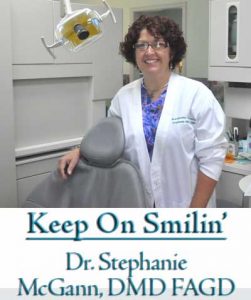By Dr. Stephanie McGann, DMD FAGD, Columnist, The Times
 We all get those pesky reminders from our dentist’s office, reminding us to have our regular preventive visit with the dental hygienist. I hear over and over that “It’s just a checkup and cleaning — I’ll get to it when I have time.” Make time, because based on new research done by New York University and Cornell Medicine, there is a significant link between healthy gums and lower risks of developing amyloid in the brain. In simple terms healthy gums without harmful bacteria and inflammation decrease the risk of developing Alzheimer’s disease.
We all get those pesky reminders from our dentist’s office, reminding us to have our regular preventive visit with the dental hygienist. I hear over and over that “It’s just a checkup and cleaning — I’ll get to it when I have time.” Make time, because based on new research done by New York University and Cornell Medicine, there is a significant link between healthy gums and lower risks of developing amyloid in the brain. In simple terms healthy gums without harmful bacteria and inflammation decrease the risk of developing Alzheimer’s disease.
So now in addition to heart disease, COPD, premature birth, tooth loss, gastrointestinal issues and more we can add Alzheimers to the list of things that are often more significant in patients with periodontal disease. Dental health is part of healthy living. So the next time your dentist bugs you to get your butt in their chair, as NIKE says, just do it.
Why is there such a connection? Well, to be honest, the answer is inflammation. We keep learning more and more about the harmful effects of chronic (long term) inflammation.
Inflammation is the body’s way of fighting against damage. When something causes cellular damage the body responds with signals to trigger the immune system to get to work. Damage can be from infection, injuries, toxic substances or other insult to the tissues. A response that lasts for a short time is an acute inflammatory response but those responses that linger for more than a few days can become a chronic problem. This long-term response by the body is what ultimately has a negative impact on organs or tissues. Chronic inflammation has been linked to concerns such as cancer, asthma and heart disease.
Chronic oral inflammation is usually related to gingivitis or periodontal disease. Although another source of chronic oral inflammation is the use of chewing tobacco. If you are one of the folks who has gums that just always bleed, you have chronic inflammation. Unlike acute inflammation that is often accompanied with pain, chronic inflammation usually has limited to no real symptoms.
The long term response to chronic inflammation can damage healthy tissue and over time this can cause damage to DNA, cause some cells to die and possibly leave deep tissue scarring. This is where so many diseases are connected. For example, with rheumatoid arthritis there is joint damage related to chronic inflammation. Some cancers may start with altered DNA due to chronic inflammation. Such is the case with some oral cancers – especially those related to chewing tobacco.
So what do we do? We address chronic inflammation at the source. Not everyone has chronic inflammation but more than 70% of adults have some gum disease so it’s a great place to start. Eat healthy, don’t allow injuries to go untreated and avoid toxic insults to tissues such as smoking, chewing tobacco or excess alcohol. Treat gum disease and take care of oral concerns. Inflammation is a natural part of the healing process but it’s important not to let it turn into a long term problem. There are some foods that help reduce inflammation, such as leafy greens, olive oil, blueberries and oranges to name a few. There are tons of sources to find great foods and supplements that help fight inflammation.Ask your physician and dentist about what steps you can take to reduce or limit your risk of chronic inflammation.
As we move into summer with the help of the Covid-19 vaccine we should all be able to return safely to our regular dental routines. Knowledge is power, knowing how important it is to take care of your oral health is the first step in eliminating chronic oral inflammation. Talk with your dentist and hygienist and make a plan.
Dr. Stephanie McGann, who has more than two decades of dental practice experience, is a resident of the Unionville area and owns and practices at Rainbow Valley Dental, in Valley. She is a past President of the Chester/Delaware Dental Society and she is a Fellow of the Academy of General Dentistry.






